GENERAL
The educational policy of the Doping Authority makes a clear distinction between elite sports (organised sports) and fitness (sports organised on other lines). Elite sports are subject to doping regulations. The Doping Authority has the authority to conduct doping controls on the basis of these regulations. That is not the case in the fitness sector and a different approach is therefore required.
In addition to its usual activities, the Doping Authority also engaged in a number of activities in 2017 under the auspices of the Together for clean sport action plan, which was made possible in part due to a subsidy from the Ministry of Health, Welfare and Sport. The actions related to both elite sports and fitness.
Finally, the Doping Authority is also responsible for providing the general public with information.
ELITE SPORTS
The objective for elite sports is: the prevention of inadvertent and deliberate doping infringements in Dutch sport.
The three main target groups in elite sports are:
- Elite athletes
- Support staff
- Sports associations
Elite athletes
To prepare promising athletes over a period of eight years for competition at the global level, the Doping Authority developed the 'Doorlopende Leerlijn Dopingvrije Sport' (ongoing education for doping-free sport) in collaboration with the NOC*NSF in 2015. This programme describes the knowledge, skills and attitude needed for doping-free sport for all ages and development phases.
Education
In line with these phases, the Doping Authority has developed three different basic education strategies: Bronze, Silver and Gold. Bronze provides basic information and it serves as an introduction to the topic of doping. Silver focuses more on practising skills such as checking medicines and dietary supplements. During the Gold programme, the athletes are trained to work with difficult doping dilemmas that they may encounter during their careers such as suspicions that a teammate may be involved with doping or using approved medication purely and simply to perform better. The Doping Authority conducted a total of 91 educational meetings in 2017.
Education
2014
2015
2016
2017
Bronze
-
30
35
53
Silver
-
21
15
18
Gold
-
5
7
2
Combination
-
9
23
18
Total
36
65
80
91
E-learning platform
It is difficult to schedule educational meetings for some groups of elite athletes. Nevertheless, it is important for these athletes to receive proper information as well. The Doping Authority therefore launched an e-learning platform in March 2017 that allowed athletes to follow the Bronze and Silver modules starting in March and August respectively. The Bronze module was completed in 2017 by 494 people and the Silver module by 114. For the development of this platform, a number of technical improvements were made that are covered by the action plan Together for clean sport.
Video productions
A number of videos were made for the education activities and e-learning modules in 2017. The animations about the whereabouts rules and the disciplinary procedure were produced as part of the action plan Together for clean sport. The existing video about the therapeutic use exemption procedure was shortened for the Bronze education campaign. The documentary about Andreas Krieger required only a translation. The production of that documentary was handled by NADA Germany and USADA.
Video
Explanation
Doping regulations: the basics
Basic explanation about doping regulations
Lab talk
Description of the analysis of doping samples in a WADA laboratory
Whereabouts
Explanation of the whereabouts rules
Positive: the disciplinary procedure from A-sample to suspension
Explanation of the disciplinary procedure
How to apply for a therapeutic use exemption
Explanation about applications for therapeutic use exemptions (shortened only)
Andreas Krieger: Heidi's longest throw
Documentary about the tragic story of the East German shot-putter Heidi Krieger (translation only)
Doping Information App
The first Doping Information App appeared in late 2013. The app was made for iOS and Android. There is also a responsive website. The Doping Information App allows athletes and support staff to check their medicines and dietary supplements, for example, or to check the most important doping regulations and read about the doping control procedure. The app was downloaded 5,478 times in 2017 (2016: 5,457). The total number of downloads was 24,092 at the end of 2017. The Doping Information App was updated continuously. The app was also constantly promoted, for example at educational meetings, on a range of websites, in various articles, z-cards, posters and social media.
Infographic elite sports study
In 2015, the Doping Authority conducted a study of the knowledge and opinions of national elite athletes about the anti-doping policy. An infographic was produced in 2017 with the results of the athletes with elite status.

100% Dope Free
100% Dope Free is a programme of the Doping Authority in which everyone involved with Dutch elite sports can proclaim their support for clean sport. The programme has its own website. Fourteen postings were made on this site in 2017. They were also sent automatically to all newsletter subscribers.
In addition, the 100% Dope Free – True Winner statement has been available to everyone for signing since 2007. In this way, signatories can state their support for clean sport by signing on the website or the Doping Information App, after which they receive a gold 100% Dope Free – True Winner bracelet. In 2017, 1,388 people signed the statement. The total number of signed statements is therefore now 33,979. The 100% Dope Free – True Winner statement is an initiative of the Athletes Committee of the NOC*NSF and the Doping Authority.
The programme has a number of ambassadors. In late 2017, they were: Bauke Mollema (cycling), Churandy Martina (athletics), Epke Zonderland (gymnastics), Femke Dekker (rowing), Jetze Plat (handbiking/paratriathlon), Madelein Meppelink (beach volleybal), Marianne Vos (cycling), Mirjam de Koning-Peper (paraswimming), Thijs van Valkengoed (swimming) and Vince Rooi (baseball).

Outreach Events
At outreach events, the Doping Authority is present with a stand at a sporting event in order to provide general information for large groups of elite athletes and support staff. Visitors to the stand can also sign the 100% Dope Free – True Winner statement. There were three outreach events in 2017: at the National Indoor Athletics Championships for juniors, the Athletics Day and the European Youth Olympisch Games (EYOG) team presentation.
Articles
The Doping Authority has a regular spot in the NOC*NSF elite sports magazine Lopend Vuur. Eight articles were written for the magazine in 2017.
Dutch Safeguards System for Dietary Supplements in Elite Sport (NZVT)
Dietary supplements can contain prohibited substances that are often not listed on the label. The use of dietary supplements can therefore represent a risk for elite athletes since they can lead to a positive result after a doping control. In response to this risk, the Doping Authority established the Dutch Safeguards System for Dietary Supplements in Elite Sport (NZVT). The system allows manufacturers of dietary supplements to have batches of their supplements checked in exchange for payment. The product-batch combinations that are found to be 'clean' are included in the NVZT database.
A total of 288 NZVT certificates were issued in 2017 (for 499 product-batch combinations). This is another new record (the old record was 281 certificates for 488 product-batch combinations). This indicates that the Dutch Dietary Supplements system (NZVT) is still catering to a significant need for athletes and their support staff. In total, on 31 December 2017, there were 1,178 product-batch combinations on the NZVT website (antidoping.nl/nzvt) representing 322 products, 58 brands and 16 substantive categories. Four batches were rejected because prohibited substances were found in them.
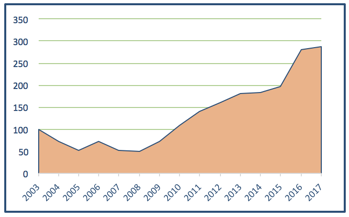
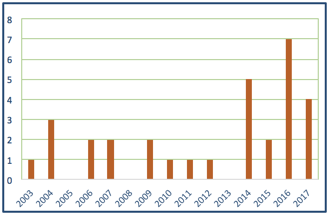
Together for clean sport (SVESS)
At the National Doping Conference on 23 April 2015, Minister Schippers granted financing for a follow-up to Racing for clean sport. Six organisations then drew up an action plan: the Dutch Athletics Union, the KNBB (billiards), the KNVB (football), NL Actief (previously Fit!Vak), the Doping Authority and the NOC*NSF (the coordinator). The plan was given the name: Together for clean sport. On 28 February 2016, the Dutch Indoor Athletics Championships was the backdrop for the launch of the project with all parties involved. The plan ran through to 31 December 2017.
In 2017, the Doping Authority completed the following activities as part of the plan of action Together for clean sport :
- a number of technical improvements to the e-learning platform
- the production of animations about the whereabouts regulations and the disciplinary procedure
- the development of an educational module for Master Coaches
- the purchase of new coach boards
- the organisation of three True Strength Seminars
- the promotion of the Supplement Checker App
The formal final meeting for the plan of action was at the annual meeting of sports associations Together against doping!. At three discussion sessions, the Athletics Union, the KNBB (billiards) and the KNVB (football) discussed their results and lessons learnt with all those present. The results of NL Actief, the Doping Authority and NOC*NSF were discussed in the middle session.
SUPPORT STAFF
Alongside the focus on athletes, there has been rising interest in support staff in recent years. This group includes, in particular, trainers and coaches but also people like doctors, physiotherapists, dieticians, masseurs, soigneurs, psychologists and parents.
A total of 24 educational meetings were organised for support staff in 2017: thirteen for trainers and coaches and eleven for other categories. The trainer-coach educational meetings are based on the Ongoing Educational Module for Doping-Free Sport for coaches. The Doping Authority has developed three different types of education in the context of this module: Trainer-Coach 3, Trainer-Coach 4 and Master Coach. The education fits in with the educational structure of the Kwalificatiestructuur Sport.
As part of the plan of action Together for clean sport, new coach boards were purchased in 2017. They are handed out to participants at the meetings and they include the main tips for clean sport.
| Education | Number |
|---|---|
| Trainer-Coach 3 | 3 |
| Trainer-Coach 4 | 3 |
| Master Coach | 2 |
| Trainer-coach, other | 5 |
| Other groups of support staff | 11 |
| Total | 24 |
SPORTS ASSOCIATIONS
Meeting of sports associations
The annual meeting for the staff of sports associations Samen tegen doping! (Together against doping!) was organised for the eighth time on 14 November in Nieuwegein and it was attended by 52 people. They were representatives of sports associations, Olympic Networks and RTOs (Regional Elite Sports Organisations) and CTOs (Centres for Elite Sports and Education). The aim of the annual meeting is to bring the participants up to date about developments in the field of anti-doping policy, particularly in the area of education.
This year, the meeting was combined with the formal final meeting for the plan of action Together for clean sport.
The average rating for the event from the participants was 7.7/10.
FITNESS
The goal for fitness (sports organised outside a club context) is: preventing or discouraging deliberate and inadvertent doping use by athletes in Dutch fitness centres. Time was also set aside for a discussion of harm reduction : reducing the health risks associated with doping.
In the fitness world, the Doping Authority focuses in particular on the people in the fitness centres: the athletes themselves but also the instructors and the owners. The Doping Authority organised education for this target group on the basis of the True Strength programme. The book Doping, the sober facts is the only work to be published directly under the auspices of the Doping Authority.
True Strength
In the Netherlands, there are 2.5 million fitness adherents. Fitness is therefore the most popular sporting activity in the Netherlands. However, research has shown that 8.2% of the fitness athletes use prohibited substances. That does not result in any anti-doping rule violations because these people are not subject to doping regulations. However, their health is harmed and so it is desirable to reduce levels of doping in fitness centres. The Doping Authority therefore decided to develop the education programme True Strength specifically for this group in order to provide information about the risks of using anabolic steroids and other prohibited substances, and about healthy alternatives for building muscle or losing weight using True Strength. The aim is to raise levels of knowledge and awareness. The values and norms of engaging in sports based on True Strength are also confirmed.
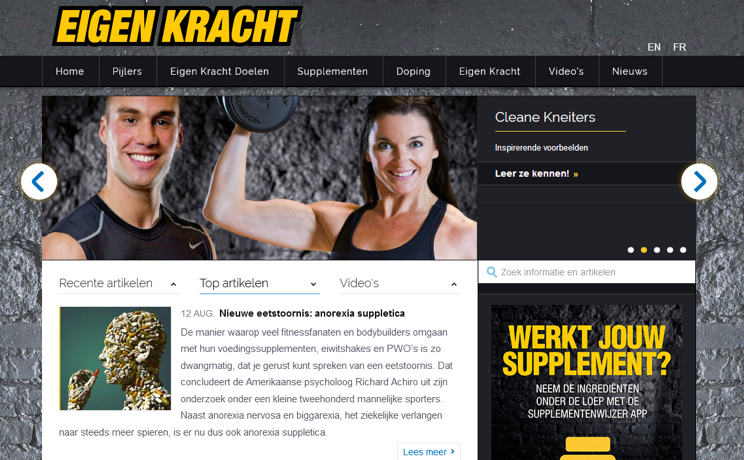
True Strength website
The True Strength website plays a central role in the programme. The site provides objective, clear and practical information about building up muscle mass cleanly and effectively, and about losing weight healthily. There is also objective information about various types of prohibited substances and the side-effects, and the doping risks of dietary supplements are discussed.
In 2017, a total of 61 factual news reports were posted on the site. They were written by three external experts (journalists or specific experts) from the fitness/bodybuilding branch and by our own prevention officers.
Supplement Checker App
The Doping Authority launched the Supplement Checker App in August 2017 under the True Strength flag. The market for sports supplements has grown explosively in the past decade. Nearly 60% of fitness athletes in the Netherlands use supplements. Elite athletes also use many supplements. The free Supplement Checker App helps athletes to use supplements responsibly and critically.
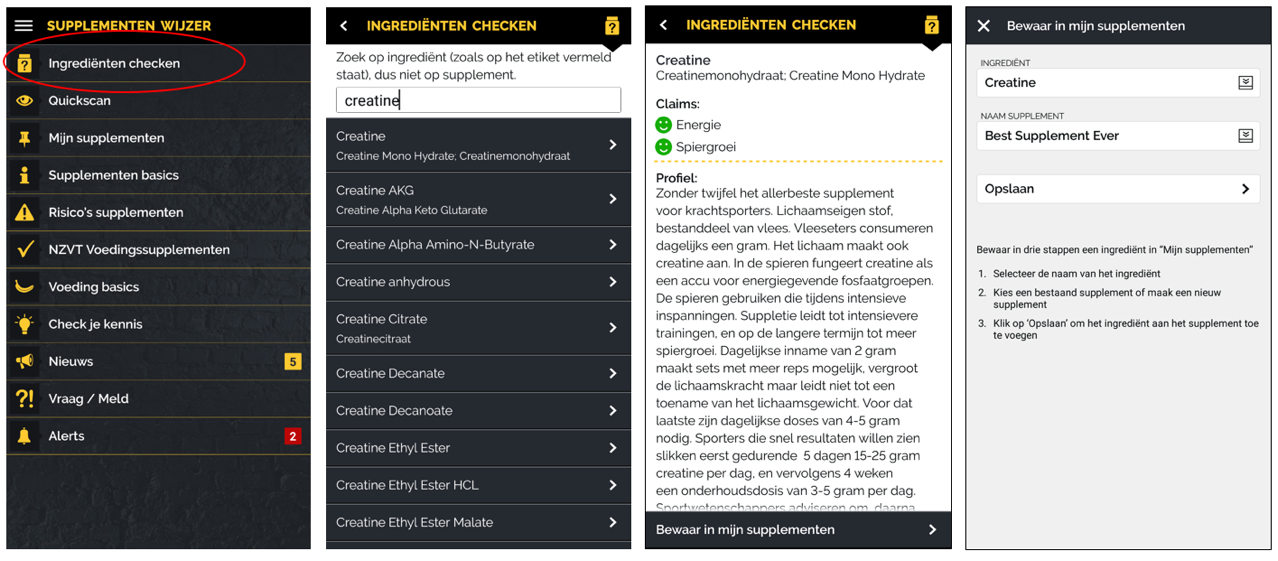
By checking which information is available about the ingredients in a specific supplement, the athlete can build up a better idea about the product and therefore make a well-considered choice. Icons are used to provide an indication for all of the ingredients in the Supplement Checker App – of which there are approximately 300 – about whether an ingredient is useful or not, whether it may be bad for health and whether it is on the prohibited list. The current profiles are updated when there are new developments. New profiles are also constantly being added. The Supplement Checker App also includes a quick scan that can be used to search quickly for claims such as muscle growth or fat loss, and which ingredients are effective. The Supplement Checker App also provides extensive background information on the basics of supplements, the risks of use, nutritional alternatives and a knowledge quiz. When official warnings are issued for certain substances or supplements (for example by the Dutch Food and Commodities Authority), they are also immediately included in the app.
We worked with the national RTL Nieuws programme during the launch. They devoted an item to the app on the evening news.
Promotion of the Supplement Checker App
Six short animation films were produced using our regular budget for the online promotion of the Supplement Checker App. The app was also promoted in various magazines. Advertisements were placed in the Muscle & Fitness and Fit!vak magazines and there were advertorials in Men's Health and Women's Health. The app was also promoted online on Facebook and Instagram.
The action plan Together for clean sport was also used to promote the Supplement Checker App with 5,000 promotional magnifying glasses, some of which were sent to a large number of gyms in the Netherlands with an accompanying letter. They were also handed out at the SAP Weekend in Veldhoven. The SAP Weekend is the largest strength & physique event in the Benelux. In addition, the app was promoted online in October and December on Facebook and Instagram. These actions were a part of the action plan Together for clean sport.
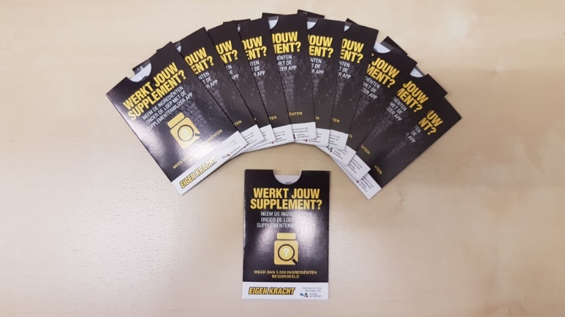
Guest lectures and meetings
The Doping Authority gave 14 guest lectures in 2017 (18 in 2016) at various educational institutes and private fitness institutions. There was also an educational meeting for the municipality of Werkendam in the context of their doping prevention programme Puur of Kuur. The same presentation was given in Helmond later. A presentation was given at an information and network meeting in Leidschendam for sports doctors from the Leiden University Medical Centre about supplements and the Supplement Checker App. The presentation was also organised for the fitness instructors of the Radboud University Sports Centre, with the focus being more on identifying - and dealing with - suspected doping.
True Strength Seminars
In the context of the action plan Together for clean sport, three True Strength seminars were organised in collaboration with NL Actief (formerly Fit!Vak). The seminars were primarily intended for fitness instructors and personal trainers. They took place in Gouda, Enschede and Eindhoven. The experts involved were Hans Kroon and Luuk Hilkens (training), Janine Reitsema and Anne-Marijke Ambergen (nutrition), Hans Wassink (doping prevention) and Vana Hutter (psychology of counselling and working with doping users).
Documentary
The documentary Back in balance - the evolution of women's bodybuilding was shown on 9 and 10 December at the SAP Weekend in Veldhoven. The documentary shows the new path that bodybuilding for women took a few years ago. New criteria and a range of new categories have been introduced to bring back 'femininity' to the sport. A version of the documentary with English subtitles has also been made. The documentary is used in various educational activities.
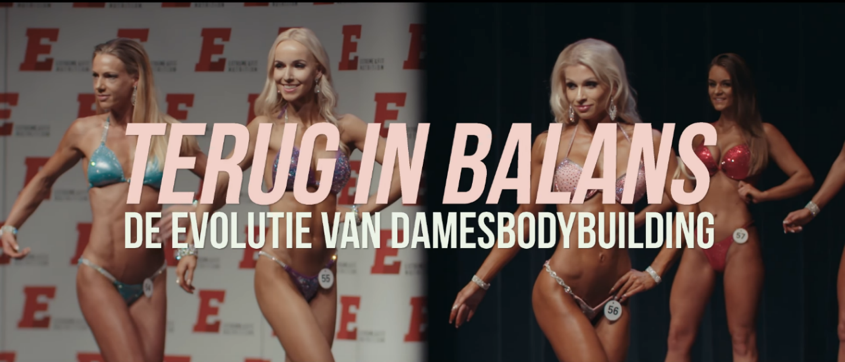
Clean Hunks
Clean Hunks are fitness athletes/body builders who prove that you can build up an impressive physique without dope. They are the ambassadors for doping-free fitness. There were 18 Clean Hunks affiliated with the True Strength programme in 2017. They are all on the site, which includes background stories and photos.
Articles
The Doping Authority publishes a large article every month in the popular bodybuilding and fitness magazine Muscle & Fitness under the True Strength banner. After the publication of the magazine, the articles are also posted on the True Strength website.
True Strength advertisements
Advertisements were placed in Muscle & Fitness to promote True Strength in 2017.
‘True Strength’ book
The last edition of the 'True Strength' (Op Eigen Kracht) book was published in 2008. This book is still on sale. Work has been taking place on a new edition that will be published in 2018.
Harm reduction: book: 'Doping, the sober facts'
Doping, the sober facts was published in October 2014. It provides the reader with a thorough overview of the substances currently used in fitness and bodybuilding. As much relevant scientific information as possible has been collected about the effects and side-effects of anabolic steroids, growth hormones, insulin, appetite-suppressing amphetamines and many other prohibited substances. There are also reports about the experiences of users in practice and knowledge from the doping scene itself. The emphasis here is on information that is often swept under the carpet in these circles. There is still a lot of interest in the book. The current edition has almost been sold out. The book is published under the flag of the Doping Authority.
GENERAL PUBLIC
Corporate website
The corporate website of the Doping Authority is www.dopingautoriteit.nl. The website is maintained continuously. We contributed 31 reports of our own to the site in 2017. In addition, ANP news reports make up an important part of the topical information. Approximately 359 ANP news reports were published on the site in 2017. This is considerably less than in 2016 (598).
Doping Email Line
The Doping Email Line is the front office for any questions relating to doping. It is manned by teams of four working in turn. All questions are processed within one working day and recorded anonymously in a database.
A total of 690 emails were received in 2017. That is 20% less than in 2016, when 863 e-mails were registered.
In addition, the numbers of questions per subject are also monitored. Individual questions could be allocated to several subjects. The percentages for each subject can be found in the table below. As in 2016, two subjects stand out: checking whether a medicine is on the prohibited list (24.8%) and questions about dietary supplements (36.5%). The third place (just over 10%) is occupied by questions from students or schoolchildren.
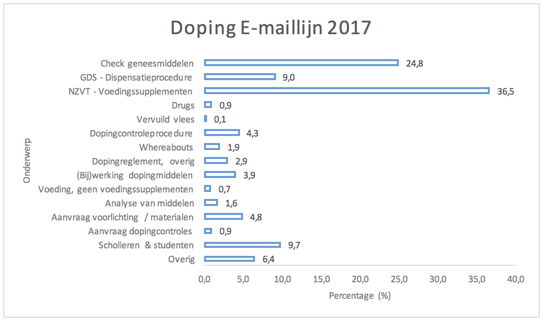
Club sports and elite sports accounted for 73% of the e-mails, fitness for 7%, and other sectors for 20%. There was one report of a possible doping violation, a representative of the press sent an email on seven occasions, and seven emails related to an athlete who was found positive.
Social media
The Doping Authority was already active on YouTube. We also opened a Facebook account in late 2016, followed by Twitter and Instagram accounts in 2017. The aim is to reach and inform the target groups better. We post, among other things, news items from the corporate website, educational videos and photos of education meetings.
Press contacts
In 2017, the Doping Authority was approached on more than 400 occasions by the media, both for information and comments about current events and for answers to in-depth questions not related to topical issues. The CEO of the Doping Authority acts as spokesman. In his absence, or when specific topics are involved, the Doping Authority's Scientific Policy Officer sometimes stands in for him.